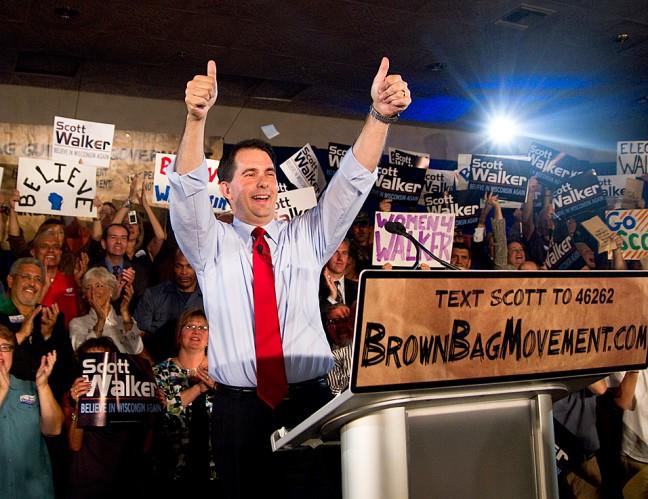Down and out are Wisconsin Democrats. Since 2010, this state’s Republicans have scored victory after victory. As the Wisconsin State Journal reports, Wisconsin’s Republicans have won a U.S. Senate seat, three gubernatorial elections, two attorney general elections and control of the Assembly and Senate. It’s hard to see how Democrats have any hope for 2016, but inexplicably, they do.
Democrats are buoyed by the fact U.S. Sen. Ron Johnson holds the most vulnerable seat in the U.S. Senate, or in presidential election years, Wisconsin has voted for the Democratic candidate since 1984. They think this trend will hold and Democrats will begin to retake Wisconsin.
As someone who usually votes for the Democratic party, I hold no such optimism. The past six years of Wisconsin politics have shifted the state so drastically that, unless there is a major cultural change, this state will remain in Republican control.
Several aspects clue one to this outcome — voter ID laws, campaign spending and the 2016 Wisconsin Republican brand.
Liberals have said, since their inception, voter ID laws passed signed by Gov. Scott Walker were done in order to suppress the votes of minorities and those most disadvantaged, who tend to vote for Democrats. Republicans have claimed these laws prevent voter fraud, even though multiple studies have proven voter fraud doesn’t exist. One Republican, U.S. Rep. Glenn Grothman, R-Campbellsport, broke ranks when he admitted voter ID will help Republican presidential nominees win Wisconsin.
Ultimately, if these sorts of policies help a Republican win one election, they’ll help them win multiple. This conjecture isn’t just my opinion; it’s a reputable fact. A recent study, conducted at UC San Diego, stated, “The results are clear. The effects of voter identification laws are more pronounced and more negative for those on the political left.”
Democratic turnout drops, due exclusively to voter ID laws, by 7.7 percent compared to 4.6 percent for Republicans. The liberal-conservative split is even more alarming. With voter ID laws, strong liberals drop in turnout by 10.7 percent compared to 2.8 percent for strong conservatives. How do Democrats win when their base cannot vote?
Money can be, arguably, a bigger issue for Democrats. David and Charles Koch have, directly or through their organizations, spent 10 of millions of dollars on Wisconsin politics promoting Republicans. There is no sign this mountain of money will run out any time soon. Conversely, one of the Democrats biggest backers — unions — have taken a hit since Act 10, which lead to plummeting union membership. This means less donations and activists for the Democrat’s side.
Undoubtedly, the biggest reason why the Republicans will not in the near future have any major losses is because of Wisconsin’s Republican brand. Many see the Donald Trump insertion into the Republican party as a wedge that could tear the party apart. Specifically in Wisconsin, Walker’s terrible approval ratings have been assessed as a symbol of the weakening of the party.
Not only do these dismaying signs play into Wisconsin Republican’s hands, they illustrate the unity of the party.
First up, Donald Trump. Apart from feud Trump and U.S. Sen. Ted Cruz, R-Texas, have, they’re basically the same candidate ideologically. Both are socially pro-life, want Planned Parenthood to be defunded, are against gay marriage vehement Second Amendment supporters and want to rid the country of the Department of Education. Economically, Trump and Cruz recognize the power of the top 1 percent, advocate for a lower corporate tax rate, oppose the Trans-Pacific Partnership and oppose raising the minimum wage.
Given this information, only minute differences separate Trump and Cruz, differences not big enough to split a party. Since 83.3 percent of Wisconsin either voted for Trump or Cruz, I would say the Republican party has a clear ideology in Wisconsin.
Moving onto Walker’s poll numbers, there’s a certain caveat within them. Overall, Walker’s approval rating is 40 percent, but among Republicans, his approval rating is 80 percent. This shows a strong unity within the Wisconsin Republican party. Even though Walker has been a polarizing figure, rubbing many people the wrong way, he’s been able to maintain the support of the Wisconsin Republican base, something very impressive after six tumultuous years as governor.
And because of this unity, this money and these voter ID laws, Wisconsin Democrats will have marginal success, at best, in halting the Republican party in 2016.
Aaron Reilly ([email protected]) is a freshman majoring in social work and economics.





















